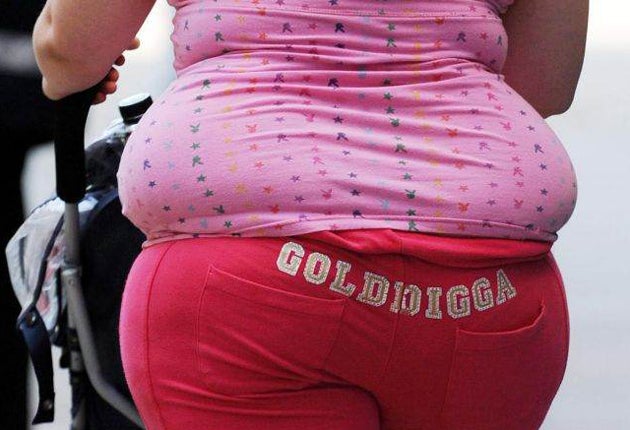Obese choose surgery over healthy living

Your support helps us to tell the story
From reproductive rights to climate change to Big Tech, The Independent is on the ground when the story is developing. Whether it's investigating the financials of Elon Musk's pro-Trump PAC or producing our latest documentary, 'The A Word', which shines a light on the American women fighting for reproductive rights, we know how important it is to parse out the facts from the messaging.
At such a critical moment in US history, we need reporters on the ground. Your donation allows us to keep sending journalists to speak to both sides of the story.
The Independent is trusted by Americans across the entire political spectrum. And unlike many other quality news outlets, we choose not to lock Americans out of our reporting and analysis with paywalls. We believe quality journalism should be available to everyone, paid for by those who can afford it.
Your support makes all the difference.Overweight Britons are turning to the surgeon's knife to treat the consequences of the obesity crisis, as efforts to change lifestyles have failed.
Hospital admissions for obesity rose 30 per cent last year to top 10,000 for the first time. Most of these were for stomach shrinking operations which soared by 70 per cent to 7,200 in 2008/9.
Surgery costs £5,000 to £15,000 in the private sector, carries a high risk of complications and is performed almost four times more often on women than it is on men. It is available on the NHS only to people who are grossly overweight – with a Body Mass Index of 40 (or 35 if there are associated medical complications), equivalent to a weight of 17 stone for a woman of average height (5 ft 4 inches) or 19 stone for a man (5 ft 8 inches).
Those not fat enough for surgery choose drugs. Prescriptions for obesity medication were up 13 per cent in 2009 to 1.45 million, an 11-fold rise in a decade.
The figures published by the NHS Information Centre contained one glimmer of hope – the percentage of the population who are obese appears to be falling, suggesting that the 30-year obesity explosion may have peaked. Between 2008 and 2009, the proportion of obese men fell from 24 to 22 per cent and of women from 25 to 24 per cent. Consumption of fat and sugar was down and fruit and vegetables was up.
But Tam Fry of the National Obesity Forum (NOF) challenged that view. "Although obesity may be levelling off, that pertains only to a better-off section of the population. The obese are getting heavier – exponentially so," he said.
The figures showed increasing reliance on medical solutions for a lifestyle problem, he said. But a report last year commissioned by the NOF and the Royal College of Surgeons concluded that obesity surgery paid for itself within a year by helping to cure associated conditions and getting people off social security benefits and into work.
"The problem is it is putting huge demands on Primary Care Trusts (PCTs). Some are raising the bar so you have to have a BMI of 45 or even 50 to qualify for surgery," he said.
In Portsmouth, a 20 stone man, Darin McCloud, who has diabetes, was told last month by his PCT that he would not qualify for a gastric bypass operation until he was 21 stone. He is now eating three quarters of a loaf of bread, four packets of crisps and bacon rolls every day to get bigger.
"I have had diabetes for 15 years and I'm scared of being a burden on my family – but I still eat. There is a switch somewhere but I can't turn it off. That's why I need help," he told a newspaper.
There are two main types of obesity surgery – the gastic band, in which a band is tied around the stomach to reduce its size so a smaller amount of food is required to produce the feeling of fullness, and the gastric bypass, in which the digestive tract is re-routed past most of the stomach so less food is digested.
Obesity costs the NHS more than £4bn a year according to the Department of Health, and surgeons say the rising cost could be curbed if surgery were provided more widely. However, other means of reducing weight must be tried first.
John Black, President of the Royal College of Surgeons, said: "There remains significant unmet patient need for bariatric surgery in Britain."
Join our commenting forum
Join thought-provoking conversations, follow other Independent readers and see their replies
Comments